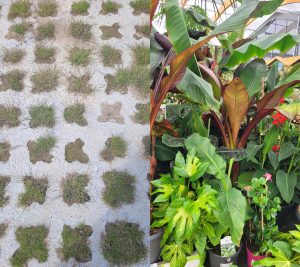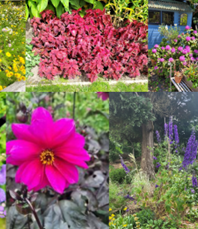
In our fast-paced modern lives, finding moments of peace and serenity has become increasingly challenging. The constant demands of work, family, and technology can overwhelm us and disconnect us from our inner selves. One powerful way to reclaim our mental well-being is by creating a sanctuary of tranquillity—a mental well-being garden. In this blog, we will explore the therapeutic benefits of such a garden and how it can nurture our mental health by offering a place of solace, healing, and rejuvenation.
Cultivating Mindfulness and reducing Stress
A mental well-being garden is a refuge from the noise and distractions of the outside world. As we immerse ourselves in the beauty of nature, our senses come alive, and we become more attuned to the present moment. This mindfulness practice helps us let go of worries about the future and regrets about the past, bringing awareness to the here and now. Tending to plants, gently pulling weeds, or observing the growth of flowers induces a meditative state, reducing stress and promoting a sense of calmness and peace.
Connecting with Nature and Ourselves
Being in a garden reconnects us with the natural world, and in doing so, we often find a deeper connection with our inner selves. The garden's sights, sounds, and scents stimulate our senses, triggering positive emotions and promoting emotional well-being. In this green haven, we can take a break from the demands of everyday life, allowing ourselves to breathe deeply and be present with our thoughts and feelings. This connection with nature fosters a profound sense of grounding, helping us gain perspective and a renewed appreciation for the beauty of life.
Healing and Emotional Release
A mental well-being garden can also become a space for emotional release and healing. As we tend to plants and soil, nurturing symbolises caring for our mental health. The garden witnesses our emotions, providing a safe space to express and process our feelings. Whether it is tears of sadness or joy, the garden gently holds our emotions, allowing us to find solace and the inner strength to face life's challenges.
Conclusion
Incorporating a mental well-being garden into our lives can be a transformative journey towards improved mental health and overall well-being. It offers a sanctuary of serenity where we can practice mindfulness, connect with nature, and heal emotionally. As we tend to the garden, we also tend to our inner selves, nurturing a sense of peace and balance that extends far beyond the garden's borders. So, whether we have a large backyard or a small balcony, consider creating a mental well-being garden and witness the profound therapeutic benefits it brings to our lives.

